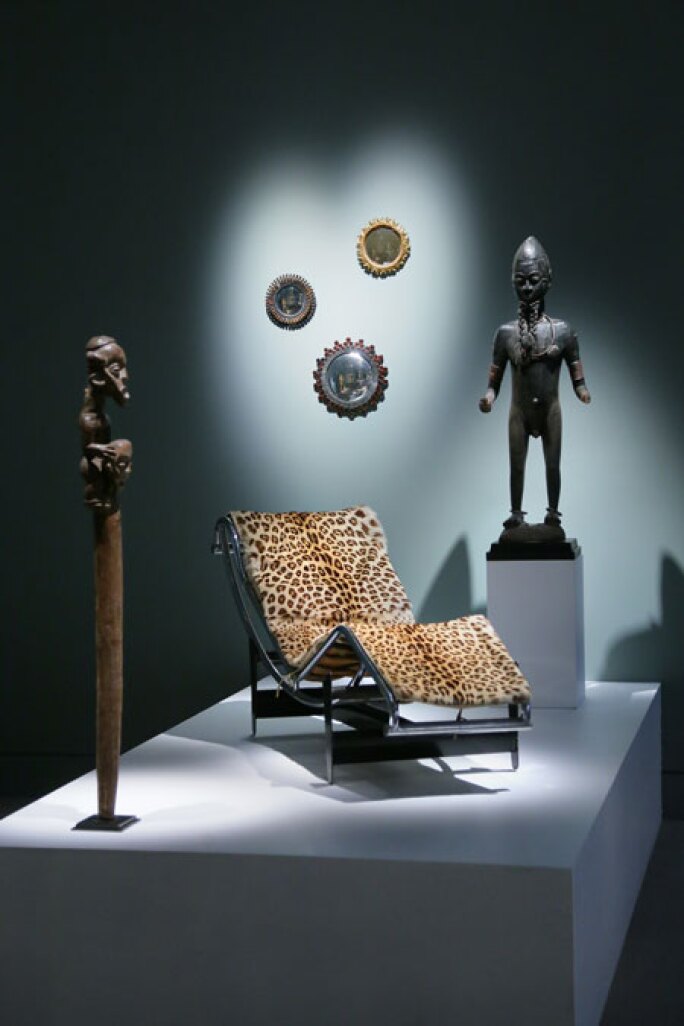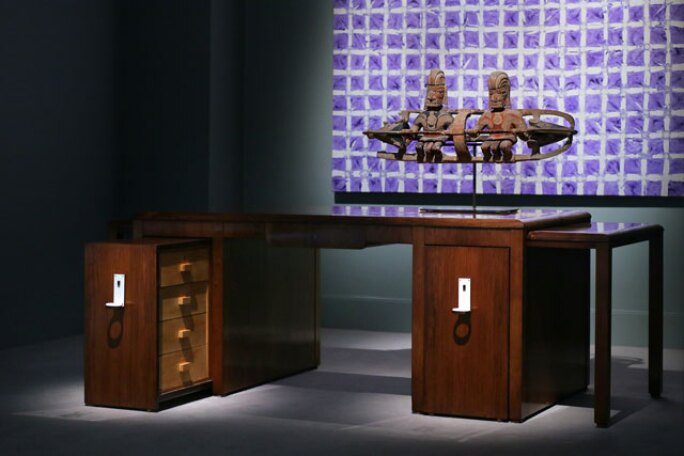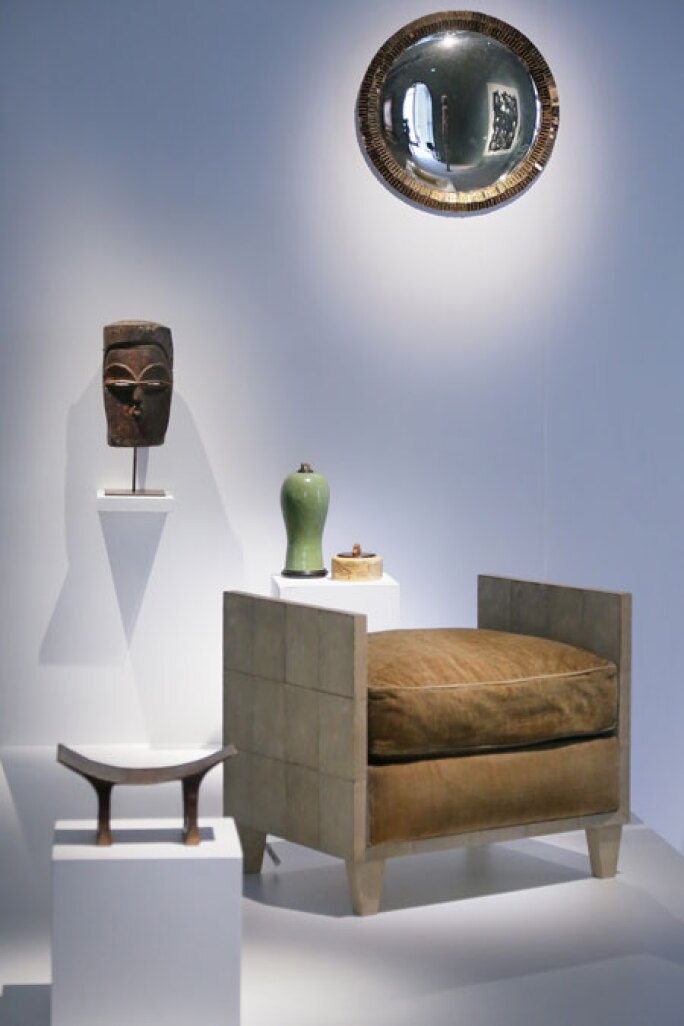A rt and design have always operated hand in hand. Rooted within design is the idea of functionality, an idea that corresponds with the ritual or ceremonial utility of art from Africa, Oceania and the Americas.
When placed together, these two differing disciplines emphasise each other’s aesthetic qualities and create a dialogue. In the recent highlights exhibition in Paris, we saw the power of combining these extraordinary non-Western forms with exquisite design, ancient sculpture and striking contemporary works.
The exhibition displayed highlights from the upcoming sales of African and Oceanic Art, including sculpture from the Collection of Howard and Saretta Barnet (New York, 14 May), our annual auction Art of Africa, Oceania, and the Americas (New York, 14 May) and Arts d’Afrique et d’Oceanie in Paris (Paris, 13 June)
Also on display were highlights from Art Contemporain (Paris, 6 June) and the upcoming Design sale (Paris, 3 May).
SEPIK FIGURE, PAPUA NEW GUINEA, 19TH CENTURY. ESTIMATE: €200,000-300,000.
DOGON SEATED MALE FIGURE, MALI, 18TH CENTURY. ESTIMATE $300,000-500,000.
In the centre of the gallery a pair of Ambassador armchairs framed the Dogon Seated Male Figure. The curvaceous form of each armchair, with a deeply curled seat and undulating backrest, mirrored the shapes within the Shaman’s Mask from southeast Alaska: a round face sweeping up to pronounced red ears and encircling dramatic eyebrows and a wide-set grimacing mouth.

New York-based couple Howard and Saretta Barnet amassed their carefully curated collection of just 40 objects over the course of 50 years to include geographically and ideologically wide-reaching works of art, which they combined in their home with contemporary art and old master drawings.
Sculptures from the Barnet collection shown in Paris included the magnificent and iconic Fang-Mvai Ancestor Statue by the Master of Ntem. Its sculptural and commanding form echoes the dense muscular brushwork in Judit Reigl’s 1964 work Ecriture en masse, which was also on view.

GREEK FIGURE OF A HORSE GEOMETRIC PERIOD, CIRCA 8TH CENTURY BC. ESTIMATE: $150,000-250,000.
Another masterwork from the Barnet collection is the Olmec Jade Mask fragment, its fluid form and lustrous colour juxtaposed against the striking geometric structure of the Maison du Mexique bookshelf by Charlotte Perriand. The bookshelf was laden with treasures, including a Greek bronze figure of a horse – also from the Barnet collection. With its streamlined body, long neck and the arcing line of the mane, it is one of the most distinctive forms of the geometric period of Greek art.
ESTIMATE: €120,000–180,000.
BAULE MALE STATUE BY THE VÉRITÉ MASTER, CÔTE D'IVOIRE, FORMERLY IN THE COLLECTION OF MAURICE DE VLAMINCK, PARIS. ESTIMATE: $200,000-300,000.
LEFEM SOCIETY EMBLEM, BY THE WORKSHOP OF ATEU ATSA, WEST BANGWA, CAMEROON, 19TH CENTURY. ESTIMATE: €40,000-60,000.
The leopard fur on the innovative Chaise Longue Basculante, a collaborative venture between Le Corbusier, Pierre Jeanneret and Charlotte Perriand, acknowledges the foreign lands and non-Western cultures which embody the essence of modern expressionism and have been an influence to Western art since the 19th century. This chaise longue was once placed in the Maharaja of Indore’s bedroom. Behind stood the imposing Baule Male Statue by the Vérité Master, formerly in the collection of the Fauvist painter Maurice de Vlaminck.
RIGHT: FLY-WHISK HANDLE, TAHITI, SOCIETY ISLANDS, 18TH CENTURY. ESTIMATE: $100,000-150,000.
LEFT: AKUA KA'AI DEITY STICK, HAWAII, POLYNESIA 19TH CENTURY. ESTIMATE: €400,000-600,000.
The Paris Arts d’Afrique et d’Oceanie auction offers a refined sepik figure, a bero kanimboag formerly from the collection of Allan Stone. The lines and shapes of the rare zoomorphic designs which adorn the figure are complemented by the shapes in the painting behind. The turtles, bat and sharks engraved on the back and torso of this Sepik figure are only known to feature on one other figure.
The sophisticated architectural forms of the MB 113 Desk by Pierre Chareau paired beautifully with the form of the New Ireland Malangan Frieze placed above. The prominent lattice design in Simon Hantai‘s Tabula from 1975 acts as a striking companion and backdrop to the two.
MALANGAN FRIEZE, NEW IRELAND, 19TH CENTURY. ESTIMATE: €80,000-120,000.
As different cultural styles sat side by side, an interesting juxtaposition was created between two modernist masterpieces: a Tuarua neckrest and a Jean-Michel Frank chair. The sumptuous velvet and rough shagreen-covered surfaces of the chair directly contrasted with the lustrous patina and curved form of the incredibly rare Tuarua neckrest from the Society Islands. The neckrest is one of only a few of its type.
TUARUA NECKREST, SOCIETY ISLANDS, POLYNESIA, LATE 19TH CENTURY. ESTIMATE: €80,000-120,000.
VUVI MASK, GABON, 19TH CENTURY. ESTIMATE: €30,000-50,000.
Also featured in the exhibition, another highlight from the Design auction stood a flock of Lalanne’s distinctive and beloved sheep sculptures, from the Nouveaux Moutons series. Not far away, the powerful, intimidating wooden New Ireland Tabar head from the recognised collection of Jacques Kerchache oversaw the exhibition; its beady eyes silently observing the entwining of cultures, disciplines, style and endless possibilities for collecting and curating.
TABAR ISLAND HEAD, NEW IRELAND, 19TH CENTURY. ESTIMATE: €300,000-500,000.
Click the banners below for further information on the upcoming sales.


















